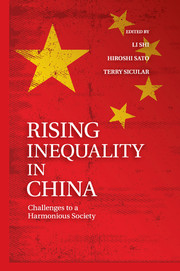Book contents
- Frontmatter
- Contents
- List of Tables
- List of Figures
- Contributors
- Preface
- Abbreviations
- Glossary
- 1 Rising Inequality in China
- 2 Overview
- 3 Housing Ownership, Incomes, and Inequality in China, 2002–2007
- 4 Educational Inequality in China
- 5 Inequality and Poverty in Rural China
- 6 The Evolution of the Migrant Labor Market in China, 2002–2007
- 7 A New Episode of Increased Urban Income Inequality in China
- 8 Unemployment and the Rising Number of Nonworkers in Urban China
- 9 Do Employees in the Public Sector Still Enjoy Earnings Advantages?
- 10 Redistributive Impacts of the Personal Income Tax in Urban China
- 11 Changes in the Gender-Wage Gap in Urban China, 1995–2007
- 12 Intertemporal Changes in Ethnic Urban Earnings Disparities in China
- Appendix I The 2007 Household Surveys
- Appendix II The 2002 and 2007 CHIP Surveys
- Index
- References
10 - Redistributive Impacts of the Personal Income Tax in Urban China
Published online by Cambridge University Press: 05 July 2013
- Frontmatter
- Contents
- List of Tables
- List of Figures
- Contributors
- Preface
- Abbreviations
- Glossary
- 1 Rising Inequality in China
- 2 Overview
- 3 Housing Ownership, Incomes, and Inequality in China, 2002–2007
- 4 Educational Inequality in China
- 5 Inequality and Poverty in Rural China
- 6 The Evolution of the Migrant Labor Market in China, 2002–2007
- 7 A New Episode of Increased Urban Income Inequality in China
- 8 Unemployment and the Rising Number of Nonworkers in Urban China
- 9 Do Employees in the Public Sector Still Enjoy Earnings Advantages?
- 10 Redistributive Impacts of the Personal Income Tax in Urban China
- 11 Changes in the Gender-Wage Gap in Urban China, 1995–2007
- 12 Intertemporal Changes in Ethnic Urban Earnings Disparities in China
- Appendix I The 2007 Household Surveys
- Appendix II The 2002 and 2007 CHIP Surveys
- Index
- References
Summary
Introduction
Taxation is a major source of fiscal revenue and has a strong effect on income distribution. Taxation can either reduce inequality or make inequality worse, depending on the type and rate of taxation. Generally, a personal income tax will improve inequality, whereas a general sales tax will exacerbate inequality. This is because with the former, there is a statutory rate that increases with income, and with the latter, tax is collected from everyone based on consumption rather than on earnings. Therefore, a tax system that relies heavily on a general sales tax as opposed to a personal income tax has an adverse impact on income distribution. This is precisely the case in China.
A tax is progressive if tax liability relative to income rises as income increases. Typically, the statutory rate of the personal income tax increases with income, thus it is progressive. In fact, it is usually the most progressive element in the tax system. Given that the personal income tax is progressive, the extent to which it contributes to reducing inequality depends on its rate, or the proportion of the personal income tax to the total income. As will be seen later in this chapter, the contribution of the personal income tax to reduce inequality mainly depends on two components, its progressivity and the average tax rate. Additional contributions can be derived by raising the average rate of the personal income tax while holding the progressivity constant, or vice versa. It is clear that the personal income tax in China is progressive because there is a very high statutory marginal rate. The extent of the contribution of the personal income tax to inequality therefore relies on the average proportion of the tax in the total income.
- Type
- Chapter
- Information
- Rising Inequality in ChinaChallenges to a Harmonious Society, pp. 362 - 383Publisher: Cambridge University PressPrint publication year: 2013
References
- 1
- Cited by



